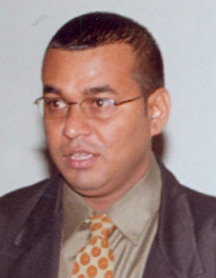The National Assembly last Thursday passed legislation which is intended to create a steady flow of adequately trained and certified surveyors and establish a board which will regulate the profession.
The Bill, titled the Land Surveyors (Profession) Bill, was brought by Member of Parliament (MP) and Natural Resources Minister Robert Persaud and passed unanimously following a debate, and an amendment.
In his presentation, Persaud lamented the inadequate number of certified surveyors in Guyana, as well as the inadequate regard they are given. He pointed to the momentous role surveying has played in the development of the country, and continued that inadequate attention to the field has produced a situation where the existing compliment of surveyors is inadequate to satisfy current demand.

He noted the rapid expansion taking place in the mining, housing, forestry and farming sectors, all areas where surveying work is a necessity, and said that the booms being experienced in these areas have underlined the need that exists for such professionals. Furthermore, he said that the lack of surveyors is compounded by the fact that some surveyors are guilty of doing sub-standard work.
The minister told his fellow parliamentarians that there have been complaints about the quality of work being done, and that there are even cases where persons are said to have impersonated surveyors.
The minister said he believes that the Bill will address these situations. Once implemented, the legislation will necessitate the establishment of a Board of Surveyors to manage the profession, and put measures in place to have adequately trained and certified surveyors added to the existing compliment. Specifically, the board will advise the minister on needs for needed amendments after consultations with stakeholders.
Parliamentarians were in agreement with the Bill, at least for the most part. Rupert Roopnaraine of A Partnership for National Unity (APNU) cautioned the minister that a clause in the Bill allows government surveyors to take on private work without the ‘ok’ of the Land and Surveys Commission, and could therefore allow the for the creation of an uneven playing field.
As such, he suggested an amendment.
He said that consultations with private stakeholders had revealed that they were concerned that government surveyors would have an unfair advantage in the market if they were also able to undertake private business whenever they saw fit. Government contractors are assured substantial amount of such work since they would likely be called to work on government projects. If they are also able to tap into the private market indiscriminately they could present a problem for private surveyors.
As such, Roopnaraine suggested that government surveyors be required to seek the permission from the commission before taking on private work. Before such permission is granted, he continued the commission should consult stakeholders in the private surveyors’ fraternity. The commission should make a decision based on the advice of private stakeholders, and then inform the government surveyor whether or not his/her application has been approved, and why.
This will ensure a level playing field, Roopnaraine estimated.
This proposed amendment was not opposed by the government, and the National Assembly voted to pass the legislation as amended.





